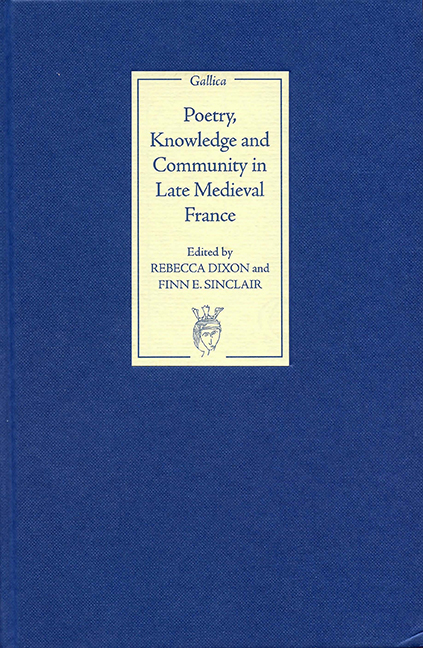Book contents
- Frontmatter
- Contents
- List of Illustrations
- List of Contributors
- Preface
- Introduction: L'Amour de Sophie. Poésie et savoir du Roman de la 1 Rose à Christine de Pizan
- PART I LEARNED POETRY/POETRY AND LEARNING
- Part II Poetry or Prose?
- 5 Les Razos et l'idée de la poésie
- 6 A Master, a Vilain, a Lady and a Scribe: Competing for Authority in a Late Medieval Translation of the Ars amatoria
- 7 Deversifying Knowledge: The Poetic Alphabet of the Prose Pèlerinage de la vie humaine
- 8 Prosifying Lyric Insertions in the Fifteenth-Century Violette (Gérard de Nevers)
- 9 The Movement from Verse to Prose in the Allegories of Christine de Pizan
- Part III Poetic Communities
- Conclusion: Knowing Poetry, Knowing Communities
- Bibliography
- Index
- Miscellaneous Endmatter
8 - Prosifying Lyric Insertions in the Fifteenth-Century Violette (Gérard de Nevers)
from Part II - Poetry or Prose?
Published online by Cambridge University Press: 25 October 2017
- Frontmatter
- Contents
- List of Illustrations
- List of Contributors
- Preface
- Introduction: L'Amour de Sophie. Poésie et savoir du Roman de la 1 Rose à Christine de Pizan
- PART I LEARNED POETRY/POETRY AND LEARNING
- Part II Poetry or Prose?
- 5 Les Razos et l'idée de la poésie
- 6 A Master, a Vilain, a Lady and a Scribe: Competing for Authority in a Late Medieval Translation of the Ars amatoria
- 7 Deversifying Knowledge: The Poetic Alphabet of the Prose Pèlerinage de la vie humaine
- 8 Prosifying Lyric Insertions in the Fifteenth-Century Violette (Gérard de Nevers)
- 9 The Movement from Verse to Prose in the Allegories of Christine de Pizan
- Part III Poetic Communities
- Conclusion: Knowing Poetry, Knowing Communities
- Bibliography
- Index
- Miscellaneous Endmatter
Summary
One of the key features of the ‘Burgundian century’ was the literary vogue for rewriting French verse romances of earlier centuries in fifteenth-century court prose. The Roman de la Violette, Gerbert de Montreuil's thirteenthcentury romance famous for its poetic insertions, was itself recast in prose for Charles I de Nevers by 1467. The prose Roman de la Violette, renamed the Gérard de Nevers by an anonymous fifteenth-century prosator, offers an important glimpse into the fate of the self-conscious artificiality of earlier French romances in the passage to prose. It provides a case study of how certain kinds of poetry in the fifteenth century were celebrated and perceived as vehicles of both knowledge and identity. In the revived chivalric mode of representation at the court of Valois Burgundy, identification with earlier poetic legends and communities, particularly those of the crusading movement and chivalric culture, gives rewarding insights into some of the forms that rewriting took in the Burgundian ducal milieu.
The fifteenth-century mises en prose are complex texts, and the passage from verse to prose text is rife with fascinating transformative processes: omission, compression, expansion, and gloss figure alongside other narratological shifts. The processes at issue are not easily summed up in the terms ‘translation’ or ‘adaptation’. Christopher Callahan, in his study of the Gérard and the prose Roman du Chastelain de Couci, looks at the question of perfor- mativity in fifteenth-century prose romance from a syntactical standpoint. He remarks that the prose romances, far from being ‘flat’ or performatively dull, are in fact lively and structured by complex hybrid figures of authority (including original narrator, prosator and patron) that require close critical attention. Finding an umbrella term to describe adequately the variety of transformations into prose is not easy. French-language criticism typically opts for the expression mettre en prose to describe the process itself, and for the resultant text, mise en prose. This is perhaps the most satisfactory term for the phenomenon. The expressions used by Callahan, ‘derimer [to de-rhyme]’ as a description of the process, or ‘roman derime [a de-rhymed romance]’ for the end result, do not do justice to the reality of the mises en prose. The subtractive or negating prefix ‘de-’ connotes for the modern critic the idea of restriction or a simplistic Monsieur Jourdain-style opposition of prose and verse.
- Type
- Chapter
- Information
- Poetry, Knowledge and Community in Late Medieval France , pp. 125 - 135Publisher: Boydell & BrewerPrint publication year: 2008



